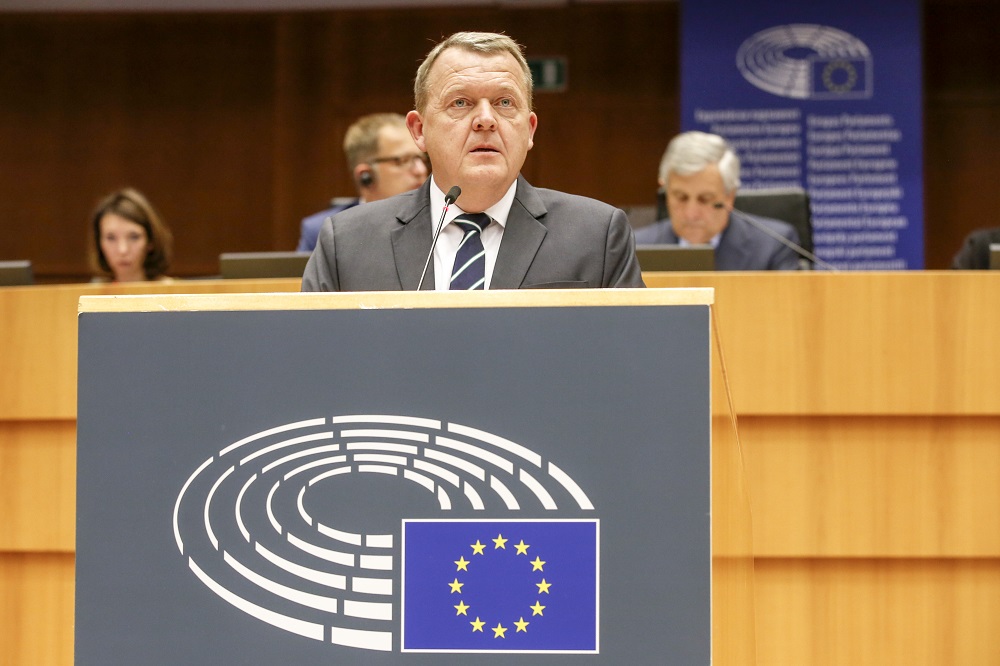Written by Katarzyna Sochacka and Clare Ferguson,

The highlights of the November II plenary session were the debate on the future of Europe with the Prime Minister of Denmark, Lars Løkke Rasmussen, and the discussion on the Council and Commission statements on UK withdrawal from the European Union. Debates were held on a Commission statement on the single market package and the long-term strategy for reducing EU greenhouse gas emissions. Members debated and adopted reports on five Western Balkan countries, as well as a report on the way forward for the World Trade Organization (WTO). A number of legislative reports were voted without debate, including on trade in goods that could be used for capital punishment, torture or other cruel treatment or punishment, the temporary reintroduction of border controls at the internal borders, and common rules for the operation of air services.
Statements on United Kingdom withdrawal from the European Union
In advance of the European Parliament vote on the withdrawal agreement expected in early 2019 (pursuant to Article 50 of the Treaty on European Union), Parliament heard a statement from the Council, and Michel Barnier as chief negotiator, on the conclusions of the special European Council meeting of 25 November. While regretting the UK decision to leave the EU, Heads of State or Government backed the withdrawal agreement and the political declaration regarding future relations with the UK, negotiated respecting the ‘red lines’ set down by both the UK and the EU. Noting that the withdrawal leads to losses on both sides, the political declaration nevertheless provides for ambitious future cooperation with the UK.
World Trade Organization: the way forward
A strong supporter of the multilateral trading system, the Parliament supports WTO reform. Responding to serious challenges to the body’s legitimacy and effectiveness, Members debated and voted (by 471 to 80 with 86 abstentions) to approve an INTA committee report on an approach to keep the WTO relevant and efficient. Of particular concern is US blockage of new appointments to the Appellate Body, which fulfils a key role in the WTO dispute settlement system. This impasse could paralyse practical enforcement of multilateral trade rules, undermining the rules-based system. Other issues include the lack of possibilities for recourse against contentious trade practices and uneven compliance with transparency rules.
Country reports – Western Balkans
Parliament debated and adopted resolutions on five enlargement reports from the European Commission on Western Balkan countries: Albania (459 votes to 112, with 62 abstentions), Montenegro, (484 to 80, 63 abstentions), the former Yugoslav Republic of Macedonia (470 to 116, 46 abstentions), Serbia (503 to 85, 47 abstentions) and Kosovo (393 to 139, 71 abstentions). Members endorsed the process to open EU accession negotiations with Albania in June 2019, once conditions are met. Members called for more progress in Montenegro on outstanding border disputes. Members expect the former Yugoslav Republic of Macedonia to progress on implementing the Prespa agreement with Greece. While Serbia’s accession process shows progress, Members consider the country should align itself closer to EU foreign and security policy, and normalise relations with its neighbour, Kosovo. Limited success on EU-related reforms in Kosovo itself mean progress on the conditions for visa liberation is an urgent step in moving closer to the EU.
Opening of trilogue negotiations
The decisions of nine parliamentary committee (ECON, EMPL, IMCO, ITRE, JURI, LIBE and PECH) to enter into interinstitutional (trilogue) negotiations were confirmed. Two further decisions, of the EMPL committee, will be the subject of a vote during the December session.
Read this ‘At a glance’ note on ‘Plenary round-up – Brussels, November II 2018‘ on the Think Tank pages of the European Parliament.








[…] Source Article from https://epthinktank.eu/2018/11/30/plenary-round-up-brussels-november-ii-2018/ […]